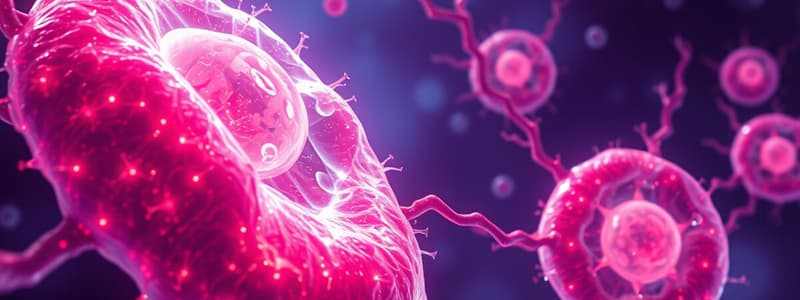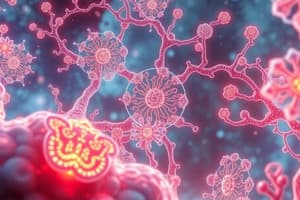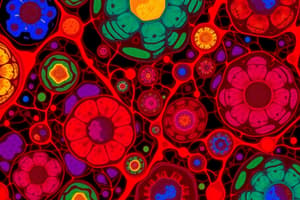Podcast
Questions and Answers
What is a major advantage of stem cells derived from a patient’s own cells?
What is a major advantage of stem cells derived from a patient’s own cells?
- They reduce the risk of rejection in transplants. (correct)
- They have higher differentiation potential.
- They do not require any ethical considerations.
- They are cheaper to produce.
Which type of stem cell can differentiate into all possible cell types, including those of the placenta?
Which type of stem cell can differentiate into all possible cell types, including those of the placenta?
- Totipotent (correct)
- Pluripotent
- Oligopotent
- Multipotent
What is the key characteristic of pluripotent stem cells?
What is the key characteristic of pluripotent stem cells?
- They can only replace damaged cells in the brain.
- They can differentiate into nearly any cell type in the body. (correct)
- They can only differentiate into tissue-specific cell types.
- They specifically support the growth of adult tissues.
What potential risk is associated with the initial production of stem cells using retroviruses?
What potential risk is associated with the initial production of stem cells using retroviruses?
Which type of stem cell is considered multipotent?
Which type of stem cell is considered multipotent?
Which type of stem cell can only produce one specific cell type but retains the ability to self-renew?
Which type of stem cell can only produce one specific cell type but retains the ability to self-renew?
What is one major advantage of using induced pluripotent stem cells (iPSCs) in research?
What is one major advantage of using induced pluripotent stem cells (iPSCs) in research?
What is one of the main challenges that need to be managed in stem cell research?
What is one of the main challenges that need to be managed in stem cell research?
Which medical condition is NOT listed as a potential application for stem cell therapy?
Which medical condition is NOT listed as a potential application for stem cell therapy?
What is a primary function of adult stem cells in the body?
What is a primary function of adult stem cells in the body?
Flashcards are hidden until you start studying
Study Notes
Stem Cells Overview
- Unique cells capable of developing into multiple cell types, integral for growth, development, and tissue repair.
- Exhibit two key abilities: self-renewal (produce more stem cells) and differentiation (transform into specialized cells like blood, nerve, and cardiac cells).
Advantages of Using Stem Cells
- Regeneration: Potential to replace damaged or lost cells, aiding treatment of various diseases and injuries.
- Continuous Division: Ability to divide indefinitely, ensuring a constant supply of new cells for repair and regeneration.
- Versatility: Can differentiate into various cell types, enhancing tissue repair processes.
Benefits of Stem Cell Therapy
- Effective in treating a variety of conditions, including:
- Spinal cord injuries
- Type 1 diabetes
- Parkinson's disease
- Alzheimer's disease
- Heart disease
- Stroke
- Severe burns
- Cancer
- Osteoarthritis
Types of Stem Cells
-
Adult Stem Cells:
- Function: Replace damaged cells, support growth; primarily found in adult tissues.
- Potency: Multipotent; can differentiate into cell types specific to their tissue of origin.
-
Embryonic Stem Cells (ESCs):
- Function: Contribute new cells to a developing embryo.
- Potency: Pluripotent; capable of differentiating into almost any cell type.
-
Induced Pluripotent Stem Cells (iPSCs):
- Function: Laboratory-created stem cells that can transform into nearly any cell type.
- Advantages:
- Nearly limitless cell type generation.
- Avoid ethical issues linked to human ESCs.
- Can originate from a patient’s cells, minimizing transplant rejection risk.
- Disadvantages:
- Use of retroviruses in initial production raises cancer risk.
- Potential for uncontrolled growth, increasing cancer risk.
Potency Levels of Stem Cells
- Totipotent: Differentiate into all cell types, including embryo and placenta.
- Pluripotent: Develop into nearly all body cell types.
- Multipotent: Differentiate into a related family of cells.
- Oligopotent: Produce a few specific cell types.
- Unipotent: Generate one type of cell but retain self-renewal capability.
Conclusion
- Stem cells are crucial for tissue repair and regeneration, promising in treating various medical conditions.
- Their versatility and self-renewal properties underpin regenerative medicine's potential.
- Ethical challenges and cancer risks associated with stem cell research and application must be addressed as the field evolves.
Studying That Suits You
Use AI to generate personalized quizzes and flashcards to suit your learning preferences.




